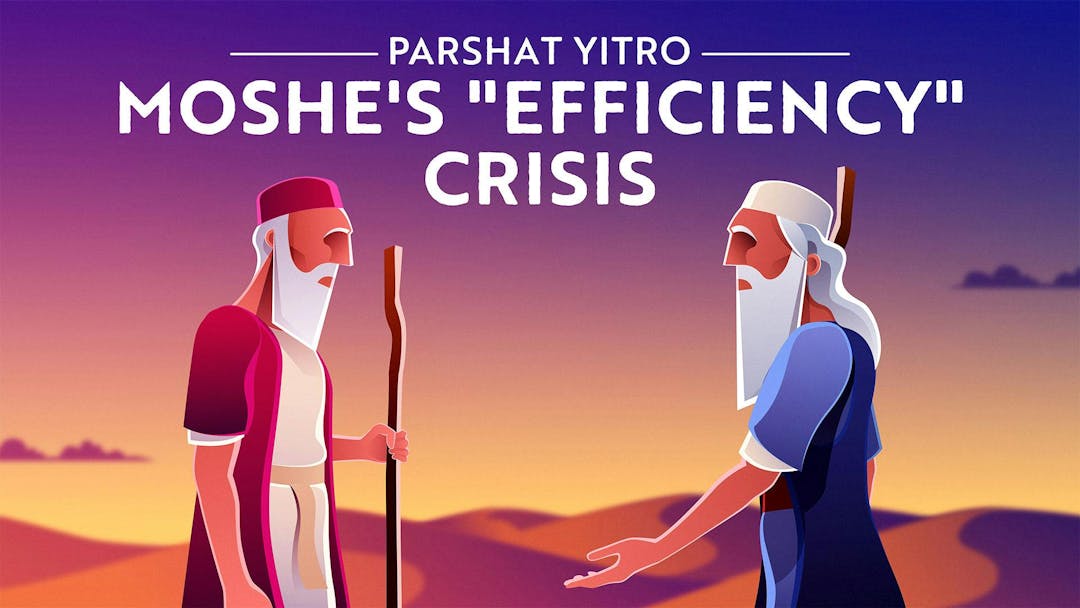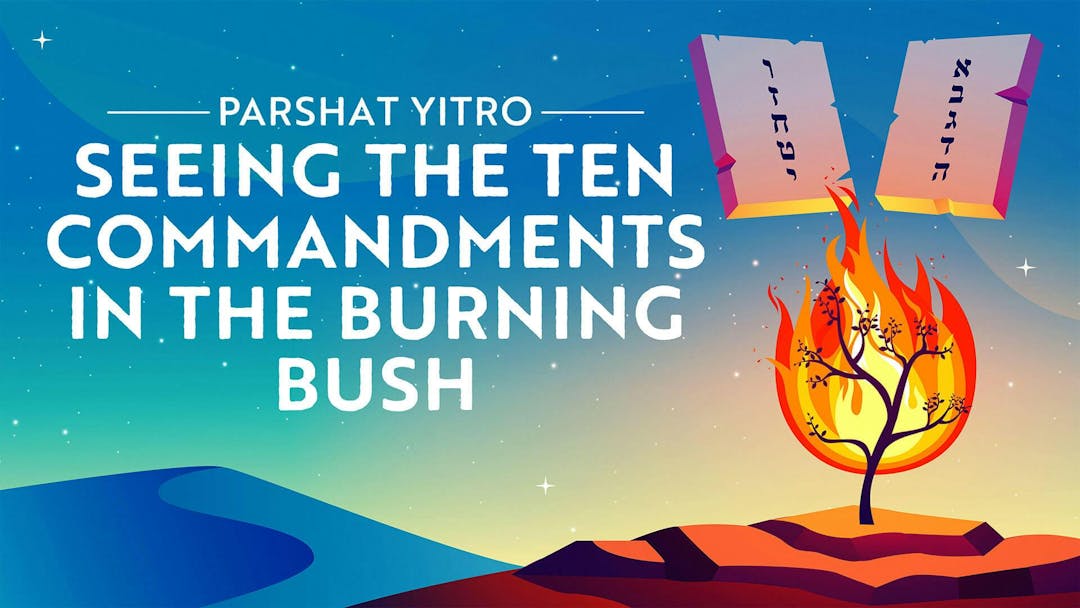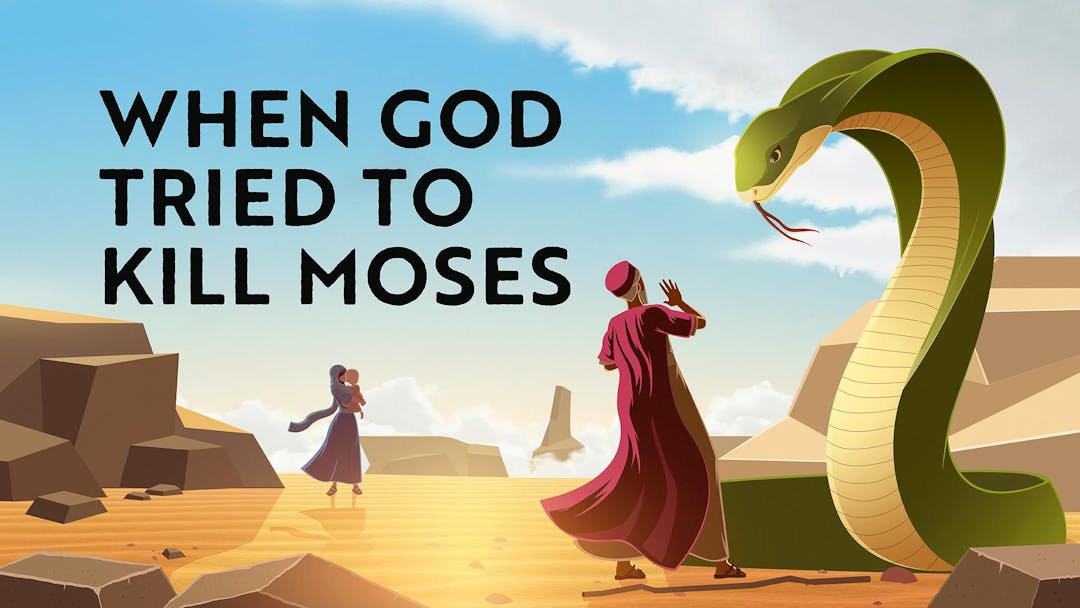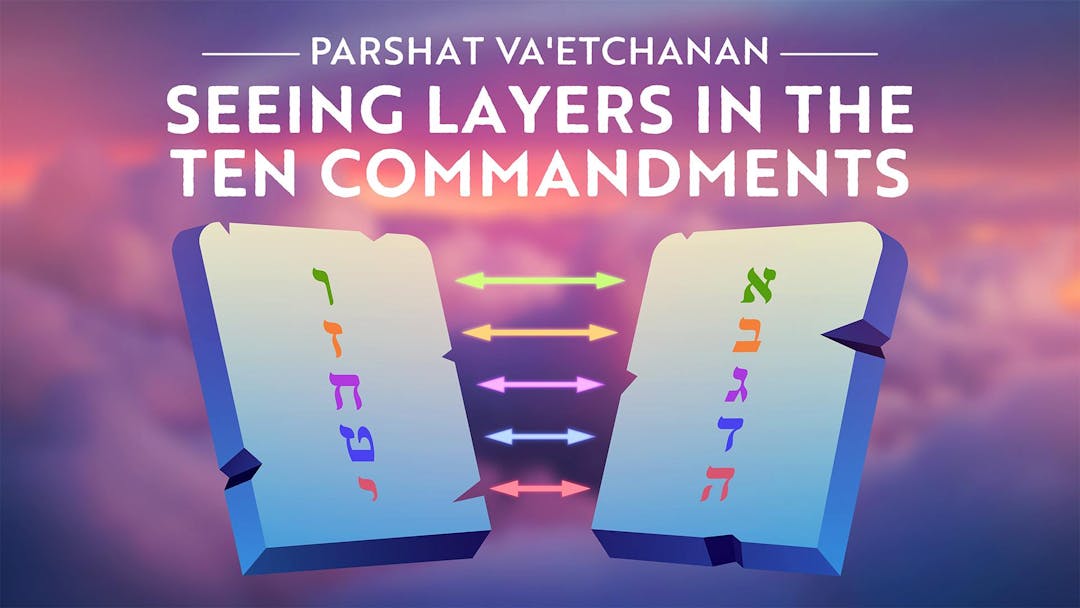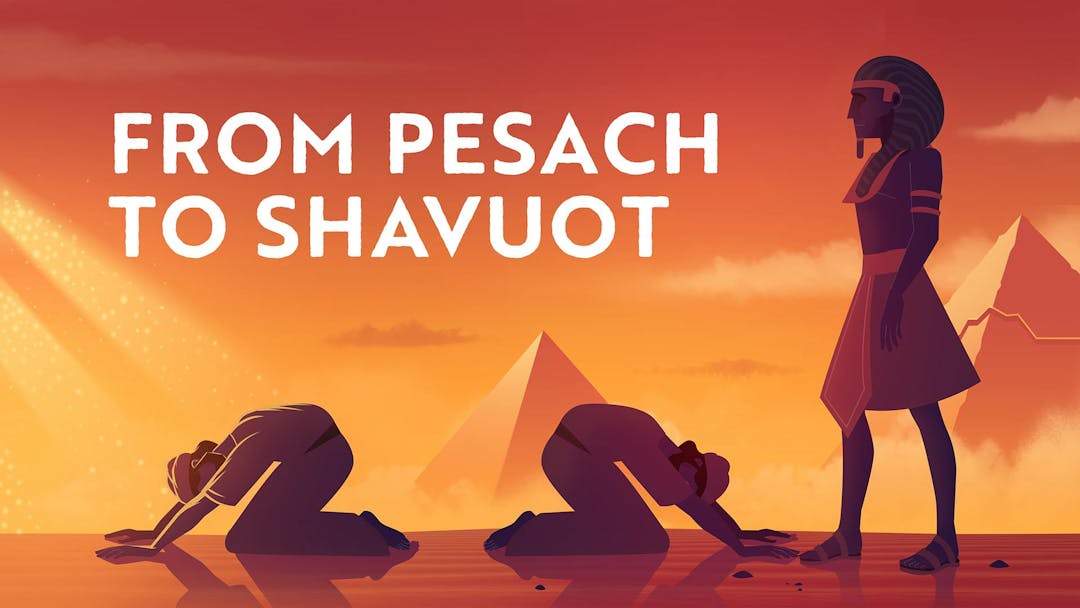Yitro is the weekly Torah portion read on February 7, 2026
Parshat Yitro: Torah Portion, Dvar Torah & Summary
Yitro Torah Portion: Exodus 18:1–20:23
Yitro (Jethro) proclaims that the Israelite God is the greatest. He advises Moses to set up a system of judges so that he does not have to answer every individual question. God calls out the 10 commandments to the Jewish people at Mount Sinai.
Featured Yitro Video
The Real Lesson Of Yitro's Leadership Advice
It wasn't good for Moshe to judge alone. And it wasn't good for Adam to be alone in the Garden. Coincidence? Watch and find out the real lesson behind Jethro's (or Yitro) leadership advice to Moses.
Yitro Torah Portion
Yitro Meaning & Commentary
Parshat Yitro Summary
Yitro Torah Portion: Exodus 18:1–20:23
Parshat Yitro interrupts the narrative of the travels of the Israelites in the desert to re-introduce a character that we haven’t heard about since Parshat Shmot: Yitro, the father-in-law of Moses. He has traveled all the way from Midian, the text tells us, along with his daughter Tzipporah (the wife that Moses had left behind when he returned to Egypt) and two grandsons Gershom and Eliezer (ie Moses’ two sons).
Why has he come? Because he heard about the amazing miracles that God performed for the Israelites – the way that God liberated this embattled nation of slaves from under the hand of the world’s most powerful and vicious tyrant – and he is delighted, impressed, and grateful.
“Blessed is God,” he says to Moses. “Now I know that God is greater than all the other gods.” This statement is even more striking when you recall that Yitro was a priest back in Midian, assumedly one who subscribed to a pagan, polytheistic world view.
Recall that up until this point, the Torah has been recounting some epic events: the ten plagues, the splitting of the sea… and we’re just about the read about the ultimate epic event: God’s revelation at Sinai. But smack in the middle of all of this awesomeness, we read about this little family visit from Yitro. If you're wondering what the meaning of this is, and why the Torah feels it necessary to tell us this story, you're not alone. Imu Shalev and Rabbi David Block wonder about this as well, and they have a theory: click here to see their video.
Anyway, Yitro makes an offering and enjoys a meal with Moses. Then, the very next day, he observes that Moses seems to be doing something strange: he spends the entire day sitting by himself while the people approach him, one at a time, in a long line. “What are you doing?” Yitro inquires of Moses.
Moses explains: "For the people come to me to seek God. If any of them has a case, he comes to me, and I judge between a man and his neighbor, and I make known the statutes of God and His teachings.” It seems like a benign statement about mediating judgments and disputes… but Rabbi Fohrman has a theory that what Moses is describing here is much loftier and spiritual, than mere legalism. Click here for that video.
But Yitro is not satisfied with Moses’ answer: “The thing you are doing is not good,” he advises him. “You will surely wear yourself out both you and these people who are with you for the matter is too heavy for you; you cannot do it alone.”
Yitro tells Moses to set up a system of judges who can help to shoulder the burden. The toughest cases will still be elevated to Moses, who will take them before God – but the lower judges can handle the more routine questions. Moses takes Yitro’s advice and sets up this system of judges.
Do you think Yitro’s advice was good? It seems wise… but Rabbi Fohrman has a theory that, however well-intentioned this advice was, it ended up having negative far-reaching ramifications – ramifications that perhaps Yitro or Moses could never have anticipated but that nonetheless seriously degraded the relationship between Moses, God, and the people. Hear his theory here in this two-part video series on Parshat Devarim and Parshat Va’etchanan.
The rest of Parshat Yitro begins what is arguably the single-most important event recounted by the entire Five Books of Moses: the revelation of God to the nation of Israel from atop Mount Sinai.
It starts with God’s declaration that if the Israelites keep His covenant (which He is about to present), they will be His "treasure" (segula) out of all of the peoples, a kingdom of princes (mamlechet kohanim) and a holy nation (goy kadosh).
This upcoming encounter with God is going to be strictly regulated in a number of ways: the people are instructed to prepare themselves for three days and warned that death will come to anyone who comes too close to the mountain during revelation.
When the day of revelation arrives, with it comes a sound-and-light show: thunder, lightning, and the powerful blast of a shofar (a ram’s horn). The entirety of Mount Sinai appears to smoke and quake violently, for – the text tells us – God has descended upon it in fire. The people, understandably, are terrified.
God proceeds to speak, as it were, and somehow all of the people can “hear” as God articulates the Ten Commandments. Here are the Ten Commandments as the text presents them (there is some disagreement as to how to parse the ten, but what follows is a common approach):
The Ten Commandments:
First Commandment: "I am the Lord, your God, Who took you out of the land of Egypt, out of the house of bondage.”
Second Commandment: “You shall not have the gods of others in My presence. You shall not make for yourself a graven image or any likeness which is in the heavens above, which is on the earth below, or which is in the water beneath the earth. You shall neither prostrate yourself before them nor worship them, for I, the Lord, your God, am a zealous God, Who visits the iniquity of the fathers upon the sons, upon the third and the fourth generation of those who hate Me, and [I] perform loving kindness to thousands [of generations], to those who love Me and to those who keep My commandments.”
Third Commandment: “You shall not take the name of the Lord, your God, in vain, for the Lord will not hold blameless anyone who takes His name in vain.”
Fourth Commandment: “Remember the Sabbath day to sanctify it. Six days may you work and perform all your labor, but the seventh day is a Sabbath to the Lord, your God; you shall perform no labor, neither you, your son, your daughter, your manservant, your maidservant, your beast, nor your stranger who is in your cities. For [in] six days the Lord made the heaven and the earth, the sea and all that is in them, and He rested on the seventh day. Therefore, the Lord blessed the Sabbath day and sanctified it.”
Fifth Commandment: “Honor your father and your mother, in order that your days be lengthened on the land that the Lord, your God, is giving you.”
Sixth Commandment: “You shall not murder.”
Seventh Commandment: “You shall not commit adultery.”
Eighth Commandment: “You shall not steal.”
Ninth Commandment: “You shall not bear false witness against your neighbor.”
Tenth Commandment: “You shall not covet your neighbor's house. You shall not covet your neighbor's wife, his manservant, his maidservant, his ox, his donkey, or whatever belongs to your neighbor."
(Note that this list of commandments is given over slightly differently when Moses repeats them in the Book of Deuteronomy.)
Rabbi Fohrman notices that there are some striking similarities between this encounter between God and humanity and an earlier time in the Bible when God spoke to a single man. Click here for his video in which he pursues that hunch and arrives at some fascinating insights about the meaning of the Ten Commandments.
If you are interested in a complementary but even wider-reaching explanation of the meaning of the Ten Commandments – and how there is actually a hidden structure embedded in these commandments, a structure that, when exposed, reveals some startling insights about why these ten laws are the very foundation of Judaism – don't miss Rabbi Fohrman’s video here.
Check out the full text of the Parsha here.
Interested in learning more about the upcoming parshiot? Check out Aleph Beta’s Parsha pages on Parshat Mishpatim, Terumah, and Tetzaveh!
